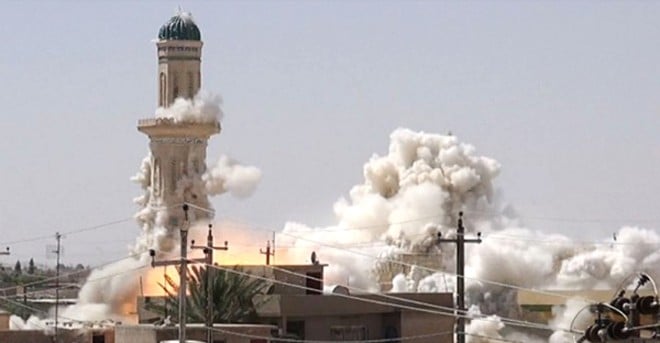
How do the advances of the ISIS affect regional players in the Middle East?

Once powerful players in the Middle East -- Iraq, Syria, Egypt, and Lebanon -- are now in the eye of the storm. Is Jordan next in line?
Iraq
The news coming from Iraq is not heartening for the Iraqi government as the sectarian Shiite militias, formed by the Iraqi government to fill the space created by the weak Iraqi army, proved unable to check gains by the ISIS fighters.
Fighting between ISIS and other Sunni insurgents intensified and threatened the Islamic State’s movement in Baghdad.
The killings showed a growing divide between ISIS and other Sunni insurgents, particularly the Naqshbandi Army, a group believed to be led by former deputy of Sadam Hussein, Ezzat Ibrahim al-Douri.
A Pentagon assessment of Iraq’s security forces concluded that "only half of the country’s military units are capable of being advised by American commandos, and many units have been infiltrated by either Sunni insurgent informants or Shiite militia members backed by Iran."
The assessment warns that Iraqi forces are very much dependent on the Shiite militias and advisers from Iran’s paramilitary and that American advisers could face safety risks if they are assigned to train certain units.
Political instability in Iraq made matters worse as the Iraqi parliament was unable to reach a deal to name a new speaker.
"The country is completely collapsing and we need to unify the nation -- the delay means more killing, more displaced and more emigration," says Mr. Nujaifi, an Iraqi lawmaker.
The failure to hold a vote for the speaker delayed the formation of a new government because under the constitution, the appointment of a speaker is mandatory before choosing a president and prime minister.
Syria
While the international attention has focused on the Israeli bombardment of Gaza, the ISIS fighters are advancing fast in Syria, too. To the surprise of many, they captured big parts of eastern Syria in the past few days.
Using heavy artillery, which it had seized in Iraq, the ISIS took almost all of oil-rich Deir Ezzor province, battling the Syrian Kurds.
ISIS is playing a dominant role in opposing President Bashar al-Assad, who has recently won a third term in office. Many rebel groups pledged allegiance to the ISIS leader, Abu Bakr al-Baghdadi, after the capture of Mosul on 10 June.
It is quite obvious now that recent advances of ISIS in Syria, following victories in Iraq last month, are tipping the balance of power in the Middle Eastern region.
The ISIS made the situation even worse as it took 400 Kurdish hostages, including 133 schoolchildren, aged between 13 and 14.
The fate of Kobani, a city at Turkey’s border with Syria that has been surrounded by the ISIS fighters, is now a national cause for Kurds. A statement from the Kurdish Democratic Union Party says all the Kurds should head towards Kobani and participate in the resistance. While the Turkish government is accused of giving "logistical aid intelligence information to ISIS", other Kurdish sources say this is unlikely though they concede that Turkey has helped ISIS in the past.
Egypt
On its part, Egypt was keen to broker a truce between Israel and Hamas as Cairo cannot afford to allow a full- scale conflict on its northern border.
In spite of its hostile relations with Hamas, which is an offshoot of the Muslim Brotherhood charged with backing jihadi elements in Sinai, Egypt cannot side with Israel as it continues to attack Gaza from the air, land, and sea.
Egypt calculates that as a result of Israeli attacks, Hamas’ political position will be strengthened while Palestinian president, Mahmoud Abbas, an Egyptian ally, will be sidelined. So, Cairo does not want Hamas to be strengthened.
Political analysts believe that the recently-elected president Abdel Fattah el-Sisi might plan to get credit for bringing about a ceasefire and gaining a diplomatic win during his first weeks in office.
Lebanon
Lebanon was recently hit by a series of terrorist attacks accompanied by the arrests of suspected suicide bombers. There is a general perception that the ISIS is behind the wave of terrorism and instability in the country.
Maj-Gen Abbas Ibrahim, head of Lebanon’s General Security intelligence agency, says in a report, "When the [caliphate] was established across the border between Syria and Iraq, ISIS made the threat that Lebanon would be in the eye of the storm," he says, adding, "The last wave of attacks is an interpretation of that threat."
There were unconfirmed reports of ISIS appointing an emir for Lebanon and plotting massive attacks on Shia areas, as well as targeting public figures.
The ISIS says its grand project is to destroy borders between Arab states and rule them all under one Islamic entity, a call that is not welcome in Lebanon, not even by ultraconservative Islamists who call for a return to the political and moral practice of the first Muslims. "The announcement of the Islamic State will backfire on all Muslims and eventually lead to the division of Iraq," says Sheikh Nabil Rahim, who has a religious show on an Islamic radio channel broadcasting from the northern city of Tripoli, in a news report.
Jordan
Political and strategic experts believe the Obama administration has not given serious attention to the advances of ISIS as it conquered much of Syria and Iraq. But if the ISIS turns its sights on the pro-Western Jordan, the US can no longer ignore what’s happening in the Middle East.
At present, Jordan does not appear threatened by an ISIS attack. But it is generally believed that if the IS is not pushed back in Iraq, terrorism perpetrated by it will eventually knock at the door of the kingdom of Jordan.